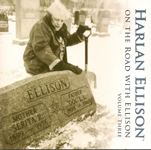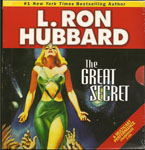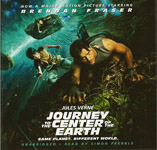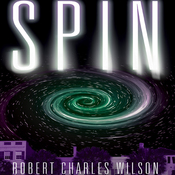
 Something Wicked This Way Comes
Something Wicked This Way Comes
By Ray Bradbury;
Performed by Jerry Robbins and the Colonial Radio Players
2 CDs – 2 Hours [AUDIODRAMA]
Publisher: Blackstone Audio
Published: 2007
ISBN: 9781433210792
Themes: / Horror / Fantasy / YA / Carnival / Americana / Ray Bradbury /
A good title might not have the verbal worth of a picture, but it’s certainly up there. And the title of Ray Bradbury’s Something Wicked This Way Comes is way up there. Not only is it delightful to say out loud, it also provides an insight into the language and theme of the story.
By evoking Shakespeare, Bradbury’s title announces his nervy aspiration to transform the language of America’s heartland into something approaching poetry. Hearing our rattle-trap vernacular transposed into song-like perfection is among the greatest attractions of this performance. Not that it always works, mind you. Sometimes, the witty exchanges between characters devolve into a series of confusing monosyllables, and sometimes the sheer weight of the mighty words flattens the actors beneath them. But the portentous speech of the lightning rod salesman in the opening scene is as perfect a transfiguration as the symphonic thunderstorm in Beethoven’s “Pastorale”.
But beyond simply the sound of the story, the title references MacBeth’s supernatural temptation, and thus foreshadows the wickedness to come. As MacBeth is undone by the crones’ magic, so are the residents of Greentown, Illinois undone by the magic of “Cooger and Dark’s Pandemonium Shadow Show”. But since Bradbury writes not to noble Elizabethans, but to working class Americans, his heroes and victims are not men who would be kings, but aging fathers who wish to be younger and abler for their sons, fatherless young boys who dream of being old enough to be on their own, and solitary schoolteachers who yearn to relive their lives in better company. I think these differences say a lot about who we are as a people. The familiar and familial desires that lead Bradbury’s protagonists into peril seem comfortingly domestic compared to the brutish ambition that drives MacBeth.
Beyond the title, there is magic only Bradbury can conjure, such as the wonder and awe of his mythical boy-heroes. Such beings appear in many of his works, but Will Halloway and Jim Nightshade are two of his best. They climb down trellises in the middle of the night to feed on moonlight and shadow, train whistles and silence. They revel as much in books as in footraces, as much in fantasy as in fact. They are breathless and happy, serious and trustworthy. These characters are to real boys as their poetic utterances are to natural language: Graceful distillations of an awkward truth.
And I love the depiction of Will’s father. As with the other elements, the relationship between Will Halloway and his father is a Platonic ideal form of what is so often messy, confused, and rueful in our own lives. How I wish I could be that father—wise and patient, kind and indulgent in all the right ways—to my own son.
One final note on the story: I have always been a little disappointed by the ending. I know, I know, the weapon against evil employed here has its roots in folklore, but it still feels a bit like defeating Godzilla with a wiffle-ball bat. After the scene in the library between Will’s father and Mr. Dark, it is a bit anticlimactic.
But the novel is still a landmark, and this dramatic production is itself very good. Child actors are somewhat hit or miss with me, but the ones who play Will and Jim mostly hit. In the gentler scenes, the actor who plays Will’s father is excellent, although he sounds a little young for the part. If he can’t quite carry the load of some of the scenes of heavier conflict, I think Bradbury’s prose is partly to blame. Such lofty words don’t easily come off with the down-to-earth punch we’ve come to expect.
All in all, this is a very good production of an American classic. It should be played and replayed, savored and shared with the ones you love.
Posted by Kurt Dietz

 On The Road With Ellison, Volume Three
On The Road With Ellison, Volume Three




